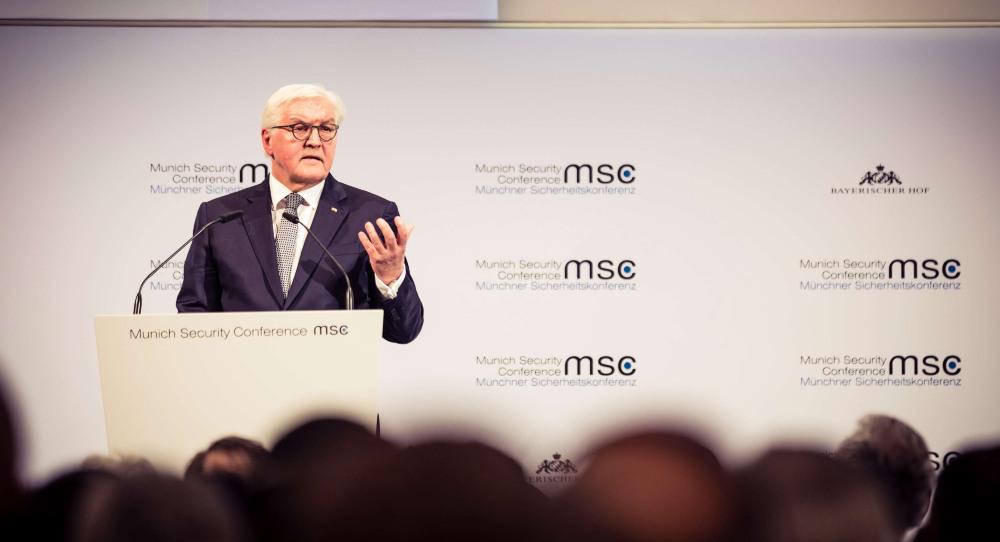Carnegie Europe is on the ground at the 2020 Munich Security Conference, offering readers exclusive access to the debates as they unfold and providing insights on today’s threats to international peace and stability.
***
Frank-Walter Steinmeier sure didn’t pull punches at the opening of the Munich Security Conference.
The president of Germany, who was previously foreign minister in Chancellor Angela Merkel’s coalition government, discarded diplomatic language to address Germany’s past and how it should use that past to take on a more responsible role in Europe.
This was important. Germany has often used the past not to assume responsibility for security, defense, and leadership precisely because of the legacy of the Holocaust. It had to set an example to its European allies.
This speech and Steinmeier’s recent ones to mark the seventy-fifth anniversary of the end of World War II were based on a double warning: the erosion of international cooperation and how it was damaging the West. Germany, he opined, couldn’t take the risk of these trends continuing.“I wish I could say that as an international community, too, we have learnt an enduring lesson from history, after 1945 and then after 1989,” he told the packed audience seated in the banqueting room of the Hotel Bayerischer Hof.
“But today, we are witnessing an increasingly destructive dynamic in international politics . . . The idea of the great power competition is not only influencing the strategy papers of today, it is also shaping anew the reality all across the world, and its tracks can be followed right to the unending wars with huge loss of life in the Middle East and Libya.”
So what’s Germany going to do about these immense challenges to the West? Don’t allow the EU to fail was his plea.
“If the European project fails, the lessons of German history will be called into question,” Steinmeier warned.
That was quite a warning. To avoid what would be a catastrophic development, it meant coming up with answers or options to French President Emmanuel Macron’s speeches about the need for a more integrated Europe.
It also meant exercising responsibility for Europe’s future. “This united Europe will only survive if we regard it as the most concrete repository for German responsibility . . . of all the dangers I sense facing Germany, I see none greater than that our German narrative of the future dispenses with the united Europe, whether as a result of a lack of insight, because of indifference, or in some people’s eyes even through intent.”
Steinmeier also spelled out how Europe had to strengthen its security and defense policy. But he was not naive enough to state that Europe could go it alone. It would be opposed by the Central and Eastern Europeans. And besides, “only a Europe that can and wants to protect itself credibly will be able to keep the U.S. in the alliance.”
However, he had no illusions that relations between the EU and the United States would quickly improve even if U.S. President Donald Trump was not reelected.
“Europe is already no longer as vital to the U.S. as it used to be,” he warned. “We must guard against the illusion that the United States’ dwindling interest in Europe is solely down to the current administration. That doesn’t justify accusations from Europe. For we know that this shift began a while ago, and it will continue even after this administration,” he added.
Steinmeier also touched on Russia, insisting that Europe and Russia had to find some ways to cooperate. Russia’s alienation, he implied, was dangerous.
As for China, particularly what role Huawei’s 5G technology will play in Europe, it dominated a very lively session labeled “The State of Democracy in the West.”
Nancy Pelosi, speaker of the U.S. House of Representatives, pulled no punches in Washington’s bipartisan opposition to having Huawei’s 5G linked to American networks. “It’s a challenge between autocracy and democracy,” she warned.
Wolfgang Schäuble, the president of the German parliament, or Bundestag, was just as emphatic (and worried) as Steinmeier about Europe’s vulnerability.
“We all know that we have to strengthen European cooperation, not to be against everyone but to be relevant. Therefore, there is an incentive to increase European cooperation in security and technology innovation, because otherwise we can’t be reliable partners neither for the United States neither for stabilizing the world,” he argued.
All in all, the Munich Security Conference’s first day was dominated by warnings for the West.
Photo credit: MSC / Kuhlmann










